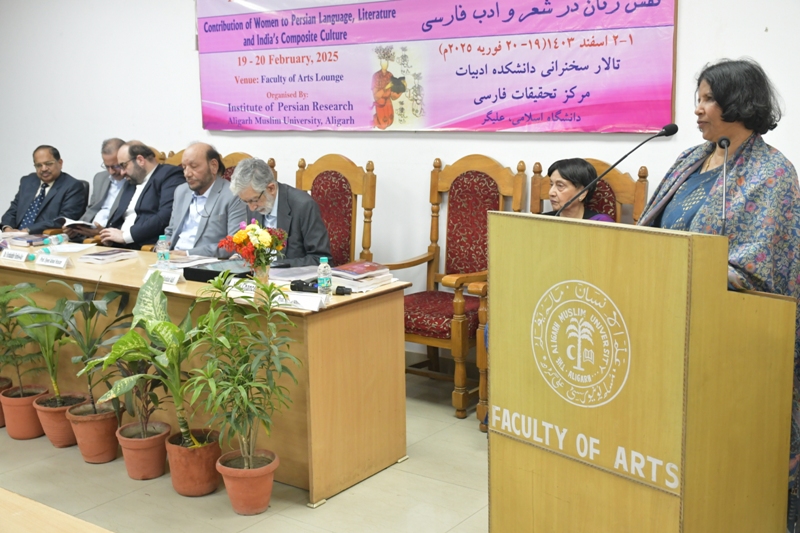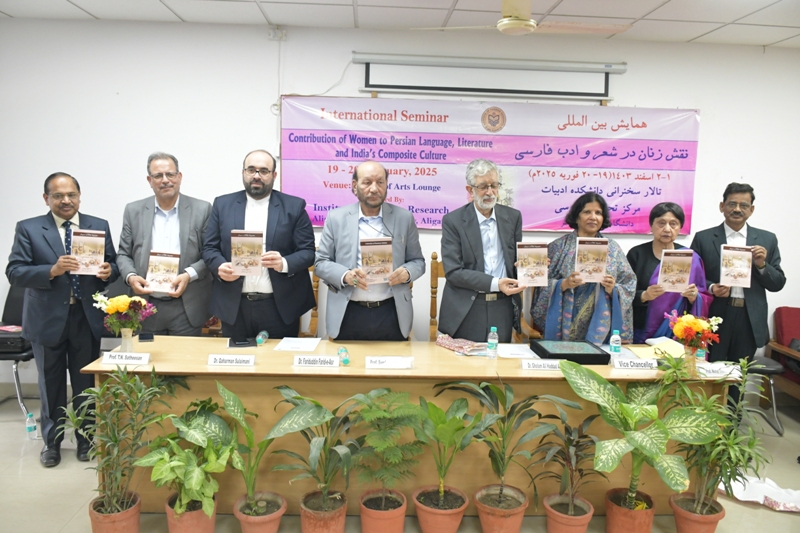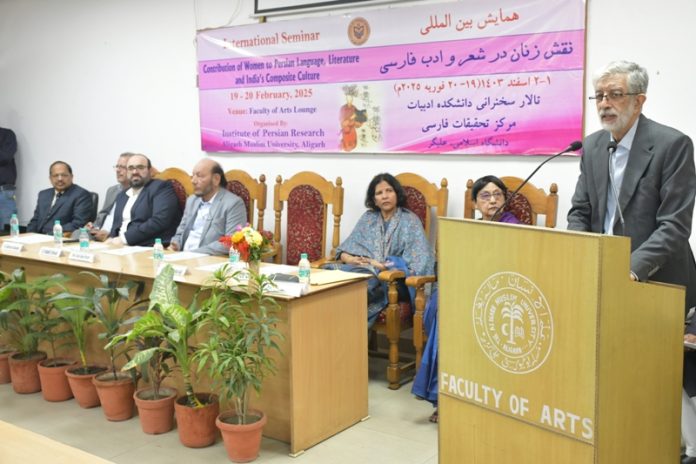Aligarh: The Institute of Persian Research at Aligarh Muslim University (AMU) hosted a two-day international seminar on “Contribution of Women to Persian Language, Literature, and India’s Composite Culture from February 19 to 20.” The seminar brought together distinguished scholars, academics, and cultural dignitaries to discuss the significant yet often overlooked role of women in the evolution of Persian literature and its impact on India’s diverse cultural heritage.
Dr. Ghulam Ali Haddad Adil, former Speaker of the Iranian Parliament, inaugurated the seminar and highlighted the historical and cultural ties between India and Iran. He expressed his admiration for AMU, stating, “Whenever I visit India, I give priority to AMU as this city holds a special place of respect for me.”

Highlighting the fundamental role of women in Persian literature, Dr. Haddad Adil emphasised that “The first teacher of every individual is their mother, who introduces them to literature through lullabies. Many of these lullabies contain compositions of ancient poets, demonstrating the integral role of women in literary traditions.”
He also reflected on the transformative impact of the eight-year Iran-Iraq war (termed Jang-e-Tahmili), which led Iranian women to explore new literary genres, documenting their personal experiences through diaries and narratives of other affected women.
Presiding over the inaugural session, AMU Vice Chancellor, Professor Naima Khatoon, praised the beauty and depth of the Persian language, stating, “Although I am not proficient in Persian, I can still appreciate its sweetness and tenderness. We Indians must read, understand, and propagate this language.”
She recalled the contributions of prominent historical figures such as Gulbadan Begum, Jahanara Begum, Razia Sultan, and Sultan Jahan Begum, encouraging the younger generation to draw inspiration from their legacy.
Professor Azarmi Dukht Safavi, Advisor and Founding Director of the Persian Research Centre, AMU delivered the keynote address, highlighting the limited representation of women in Persian literature. She noted, “While women have expressed their thoughts and emotions in both poetry and prose, unfortunately, their literary contributions do not exceed five percent.”

She elaborated on the historical constraints placed on women, which often forced them to remain behind the curtain, expressing their emotions through their writings. Reflecting on Mughal-era women, she emphasised the intellectual prowess of figures such as Gulbadan Begum, Salima Sultan, Jahanara Begum, Noor Jahan Begum, and Zebunnisa Begum.
Prof. Safavi further observed, “Women have been the driving force behind much of the world’s literature. The Persian literary tradition is filled with stories inspired by women, including ‘Qissa Char Darvesh,’ ‘Tota Maina,’ ‘Amir Hamza,’ ‘Laila-Majnu,’ and ‘Shirin-Khusro.’ Moreover, the genre of Ghazal itself owes its origin to the influence of women.”
Professor Syed Ainul Hasan, Vice Chancellor of Maulana Azad National Urdu University, Hyderabad, served as the Chief Guest. He elaborated on the intrinsic link between Persian poetry and themes of love and devotion. He stated, “Persian poetry conveys messages of love and beauty while capturing the emotions, pain, and devotion of lovers. During the eight-year war, women played an active role alongside men, enriching Persian literature with their voices.”
The inaugural session commenced with a welcome address by Professor Muhammad Usman Ghani, Director of the Persian Research Centre, who outlined the seminar’s objectives. Guest of Honour, Dr. Fariduddin Farid-e-Asr, Cultural Counsellor of the Islamic Republic of Iran, highlighted the philosophical and literary significance of women-centric narratives, stating, “The awareness movements related to women compelled society to rethink its perspectives, whether people agree with them or not.”
Dr. Qaharman Suleimani, Director of the Persian Research Centre at Iran Cultural House, remarked, “Persian literature should not be confined to male authors alone, as women have made remarkable contributions. In some instances, male writers gained fame by publishing works under the names of women, such as ‘Diwan-e-Zebunnisa Mukhifi,’ which is believed not to be the actual work of Zebunnisa Begum.”
Dean of the Faculty of Arts, Professor T.N. Satheesan, reaffirmed the historical importance of Persian as India’s official language and acknowledged the continued contributions of women in Persian literary scholarship.
Dr. Fatana Najibullah, an Afghan poet, captivated the audience with her recital of “Dubara Binyamat Watan,” a poignant poem reflecting the landscape and social conditions of Afghanistan.
As part of the seminar’s proceedings, two significant books were released: ‘Seminar Research Paper Collection’ and Jahanara Begum’s ‘Risala-e-Sahibiya,’ edited and translated by Dr. Muhammad Ehtishamuddin. Around 40 papers were presented during the two-day seminar.
The seminar concluded with a vote of thanks by Professor Muhammad Usman Ghani, who expressed gratitude for discussions and contributions. The event was conducted by Assistant Director, Professor Muhammad Ehtishamuddin, marking a successful exploration of women’s enduring impact on Persian literature and India’s composite cultural fabric.




